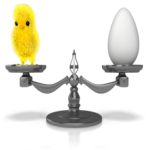What are some theories that support conducting field Observations of your workers? (Observations, Part 2 of 4)
 WYSIWYG - Familiar with that term? When observing people, what you see is NOT always what you get. It may sound a little dramatic, but let's imagine a pregnant woman falls down and feels like something is wrong with the baby. Her husband immediately places her carefully in the car and drives off at the most reasonable fast speed possible without putting wife and baby in further jeopardy. Every stop sign on the way to the hospital he pauses to see if traffic is coming and then continues through the intersections with good intentions. Now picture you are patiently waiting for your light to turn green and it finally does. This car seemingly comes out of nowhere and flies by right in front of you. You experience a type of observation bias. What is happening in your paradigm is not necessarily happening in the paradigm of the person you are observing.
WYSIWYG - Familiar with that term? When observing people, what you see is NOT always what you get. It may sound a little dramatic, but let's imagine a pregnant woman falls down and feels like something is wrong with the baby. Her husband immediately places her carefully in the car and drives off at the most reasonable fast speed possible without putting wife and baby in further jeopardy. Every stop sign on the way to the hospital he pauses to see if traffic is coming and then continues through the intersections with good intentions. Now picture you are patiently waiting for your light to turn green and it finally does. This car seemingly comes out of nowhere and flies by right in front of you. You experience a type of observation bias. What is happening in your paradigm is not necessarily happening in the paradigm of the person you are observing.
I have to warn you from professional experience, because not everyone is interested in the theory of how someone's performance changes when they are being observed. They simply may want reinforcement that it happens, even if they do not know or care why. I think it is important that we get a glimpse into some of the theories that activate behavior change simply by the presence of the observer. Imagine how powerful observation can be if the observer reinforces desired behaviors and coaches any behavior not meeting expectations.
I really recommend you check out this amazing insight into how people respond by just having a picture of eyes keeps the honest people from stealing/not paying - click here
Theoretically speaking
Hawthorne studies - The most pertinent content starts at 02:49
In a nutshell - behavior changes for the better when someone is observed. If you don't think so, do you slow down just a tad when you see a police car on the side of the road or driving behind you? Ever hear of the theory called Observation-expectancy Effect? I hope you are relating the power of this effect with the power of just having observers watching workers in the field. Casino floor cameras induce similar results.
Observer Effect (quantum measurement theory)
The Pygmalion EffectFundamental Attribution ErrorMcgurk EffectSchrodinger's Cat
The Big Bang Theory (one of my favorite shows) funny quick clips:
- "That's not overconfidence, that's Observation"
- "Schrodinger's Cat Clip 1"
- "Schrodinger's Cat Clip 2"
Theoretical Wrap-up
This post has primarily been about seeing things from different perceptions, and understanding the science behind what is happening when two or more people are near each other at any point in time. In general these theories all apply in some way (and I'm sure there are some I've missed), but revealing the principles of the theories and a little bit about how they work is what I would call "far" learning. You still need to figure out how they apply to the work you perform. My goal wasn't to provide these popular theories to answer questions, but to start asking more questions about effects observers have on anyone being observed. Behaviors improve when people know (or think) others are watching.